This section highlights people, events, and viewpoints that are central to the Civil Rights movement within the larger United States.
Bucknell-Howard Exchange
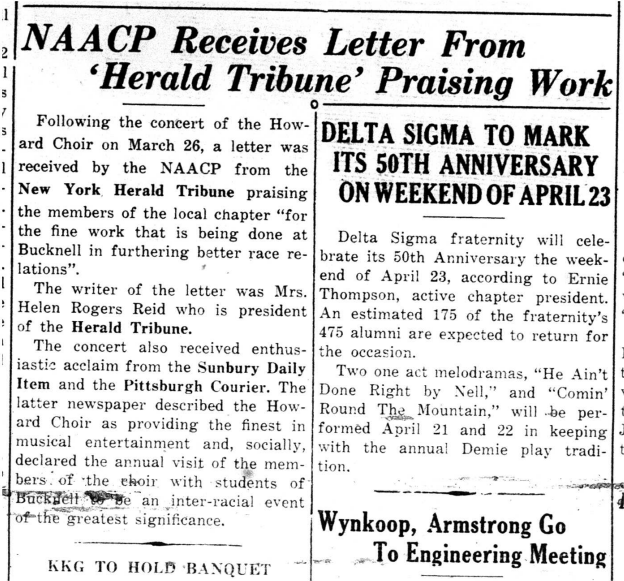
“NAACP Receives Letter From Herald Tribune Praising Work”
This April 1949 Bucknellian article shares more of Bucknell’s public laudations. After a Howard Choir concert at Bucknell, the President of the New York Herald Tribune sent the local NAACP chapter a letter praising them for “the fine work being done at Bucknell in furthering better race relations.” The letter cited the magnificent concert and the Bucknell-Howard Exchange as the main aspects of Bucknell’s achievements, and it encouraged the students, faculty, staff, and administration at Bucknell to keep doing such good work.
Bucknell Howard Exchange Begins
Bucknell begins a temporary exchange of students with Howard University in the 1950s. This collection of documents from February and March across several years reveals the beginning of Bucknell’s exchange with the historically black Howard University founded in 1867 in D.C. During this exchange, they send students to Howard for a weekend at first (and vice versa), and they propose to later allow the program to last an entire semester. These documents illustrate the program’s beginning.
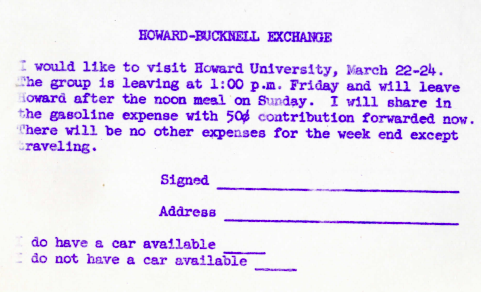
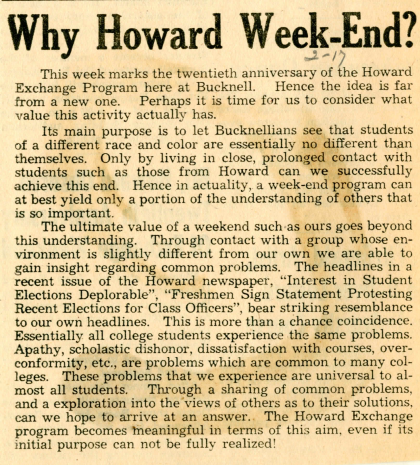
“Why Howard Week-End?”
In this February 1958 article from the Bucknellian, a student explores the purpose and benefits of participating in Bucknell’s exchange program with historically black Howard University. Overall, the student believes that the weekend program is too short to garner full meaningfulness and may be deemed performative. However, they insist that there is always value in conversation and in being able to compare the two schools’ social reactions for similarities.
Howard Students Visit Campus
In 1958, Bucknell’s Christian Association’s newsletter The Challenge published an account of the Howard students’ visit to Bucknell. This was the second annual exchange weekend. 13 Bucknell students had visited Howard University in March, and 14 Howard students returned the visit in April. Howard University is a historically black college that was founded in 1867 in D.C.. The article lists the activities they participated in while visiting. The idea of the program is that “although many of us profess to have no prejudice, it is only through living together that our beliefs can be confirmed.”
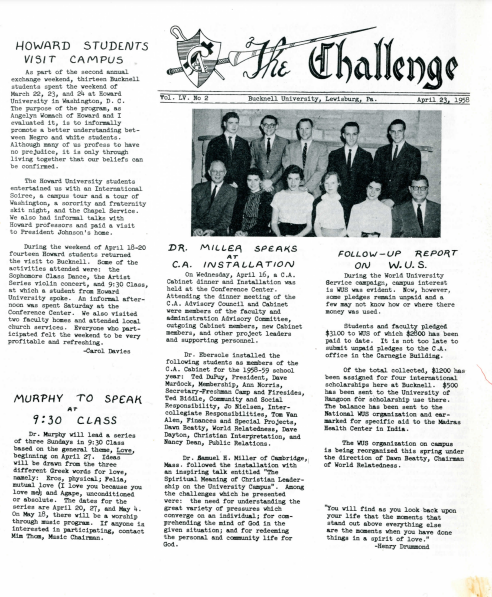
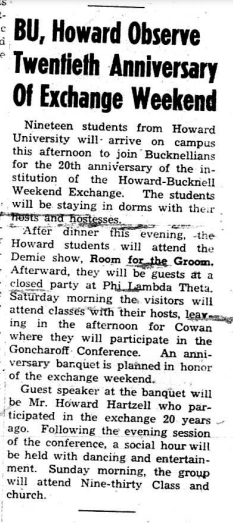
“BU, Howard Observe Twentieth Anniversary of Exchange Weekend”
This Bucknellian article from April of 1958 looks forward to the weekend when 19 Howard students will visit Bucknell to celebrate the 20th anniversary of the Howard-Bucknell Weekend Exchange. Howard University is a historically black college that was founded in D.C. in 1867, and the exchange would allow some of its students to come to Bucknell for a semester, and a group of Bucknell students would go to Howard. The article outlines the weekend plan, which includes classes, an exclusive fraternity party with Phi Lambda Theta, a banquet, and more. The guest speaker at the anniversary banquet will be Howard Hartzell, ‘41, who participated in the exchange in its first year, two decades ago.
“Ex-Bucknellian Relates Day at Howard University”
This entry is a first-hand account of the Howard Exchange Program. In this Bucknellian article from May 1958, Bucknell student Biff Ries recounts an average day at Howard University, the historically black university that was founded in 1867 in Washington, D.C. He spent a semester there during the Bucknell-Howard Exchange semester that spring. He talks about the stress and tight schedule of the day, and he cites the church as the one place where color seems to completely evaporate. After a grueling day of class, worship, and community fun, Biff falls to bed, and the fire alarm sounds. He ends with a remark on the necessity to look his door at Howard, something he wouldn’t have done at Bucknell.
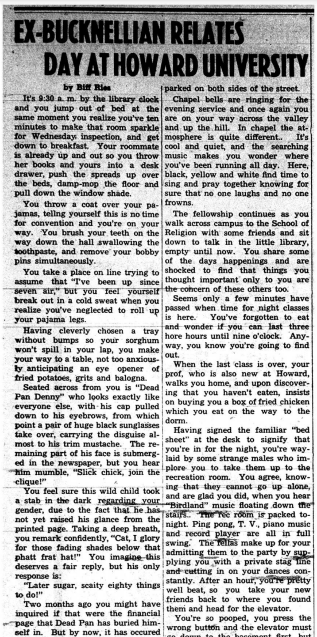
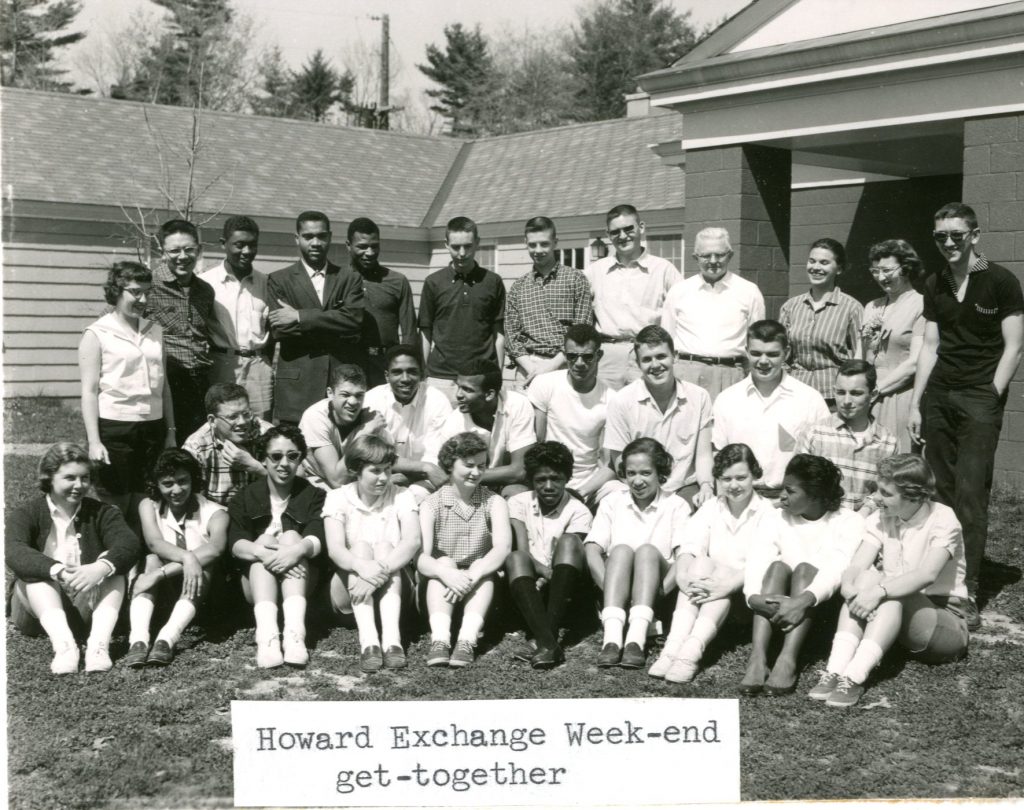
Howard University Exchange Weekend
In this collection from 1958-1959, three photographs are shared depicting students participating in the Bucknell/Howard exchange program weekend get-together at Cowan, Bucknell University’s retreat center in Mifflinburg. Students from Howard University, the historically black college in D.C. that was founded in 1867, came to Bucknell to hold discussions and celebrate the history between the two universities.
“Bucknell Charts Plan for Howard Exchange”
This news clipping from a December 1959 issue of the Bucknellian presents Bucknell’s and Howard University’s plans for a semester-long exchange program. Howard is a historically black university in D.C. that was founded in 1867. This program would allow students to participate in the student life of the two campuses. The article also mentions a future weekend exchange between the two universities.
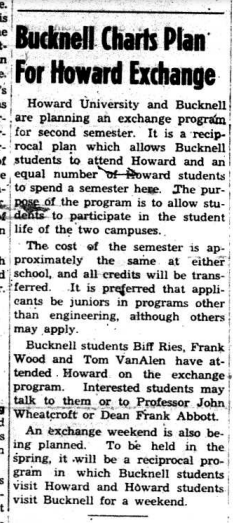
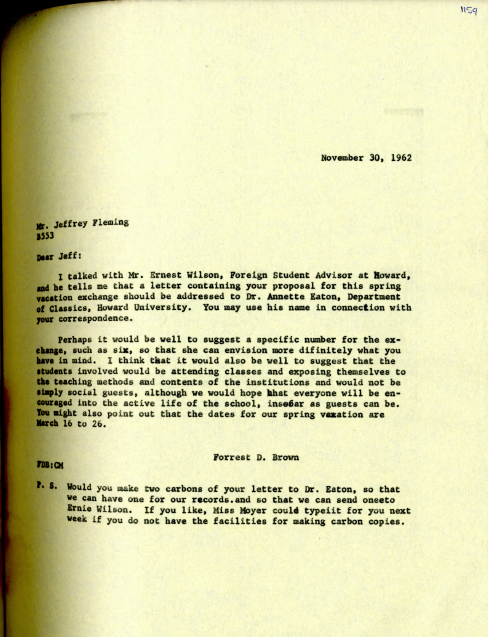
Howard Exchange Proposal
This official university correspondence from November 1962 is a letter organizing the cultural and academic exchange with students from Howard University. It advises Bucknell student Jeffrey Fleming on how to propose a visit to D.C.’s historically black college founded in 1867, Howard University, during spring break for several Bucknell students. Fleming’s proposal is promoted and distributed to increase its success.
Bucknell Howard Exchange: Spring Break
In March of 1963, Bucknell Students spent spring break at Howard University. In this entry, an essay was written by a Bucknell student regarding six Bucknell students who spent their spring break at the historically black Howard University in D.C. The essay voices the program’s hopes to garner enough interest to rejuvenate the semester-long exchange program between the two schools. On the last page of the document, a clipping from the Bucknellian in February of the same year called “Plans Made to Exchange” advertises the spring exchange option.
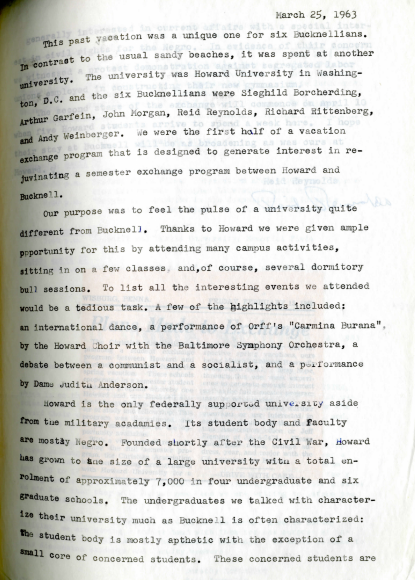
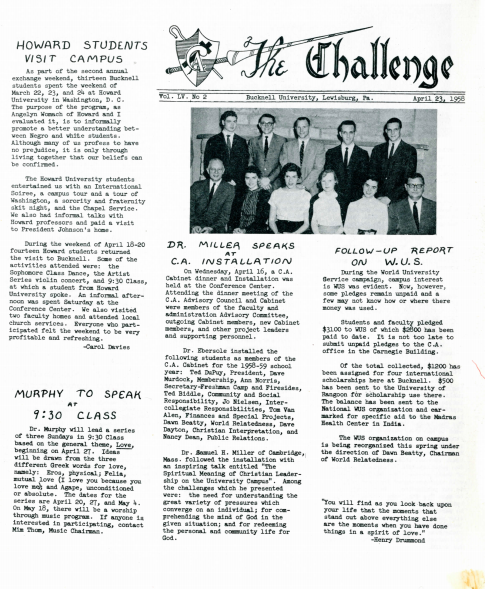
Howard Exchange Promotion in 1963
This article in the April 1963 Challenge, Bucknell’s Christian Association’s Newsletter, details six Bucknellians’ trips to Howard University over Spring Break. Students from Howard University, the historically black college founded in 1867 in D.C., are to come to Bucknell later in the semester to complete the exchange. The goal of this brief version of an exchange program is to reinvigorate student interest in the full version of the Bucknell-Howard Exchange.
Christian Association Newsletter No.4
The Christian Association’s newsletter The Challenge published an article in February 1964 about the civil rights movement and deems that it is finally underway at Bucknell. It discusses several programs the school has in place that further the movement such as the Bucknell-Howard Exchange, whereby students at Bucknell switched with students from the historically black college that was founded in 1867 in D.C. for a few weeks, and a tutorial program for high school students. The newsletter also has an article on Howard professor Dr. Robert Martin’s (1914-1993) upcoming lecture series, it informs about upcoming lectures, it shares plans for the next Burma-Bucknell March, and it includes part of Barbara Beach’s experience in the Howard Exchange.
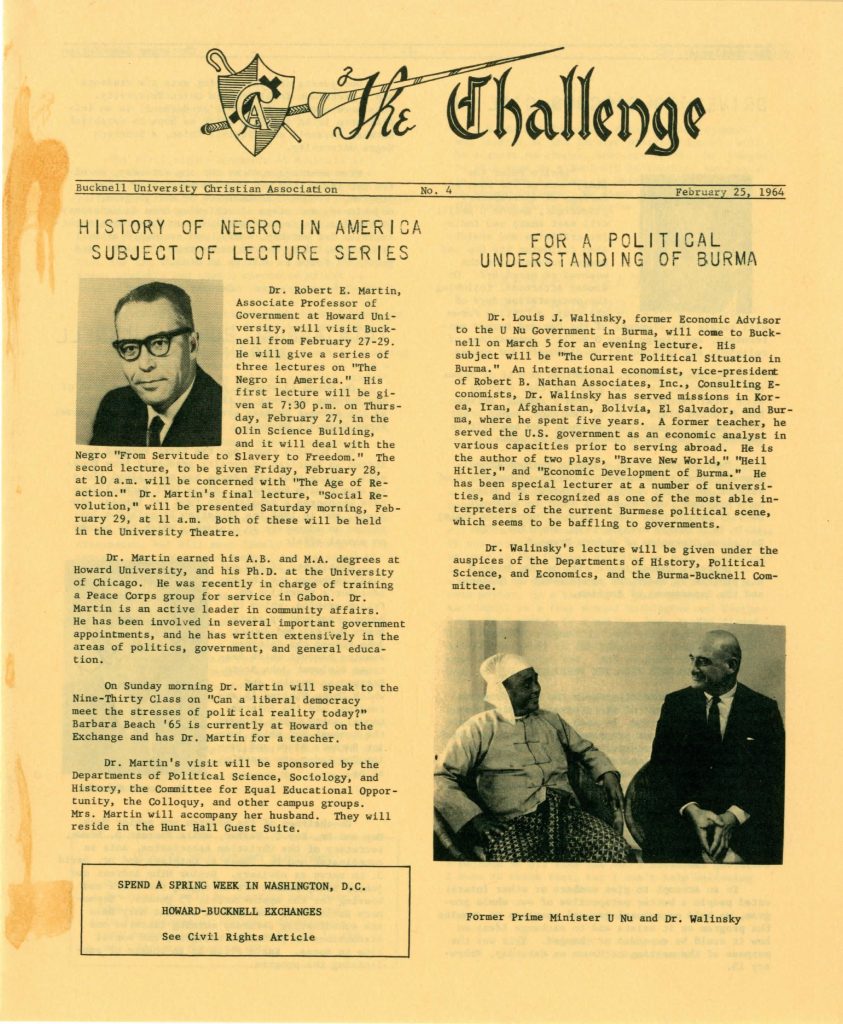
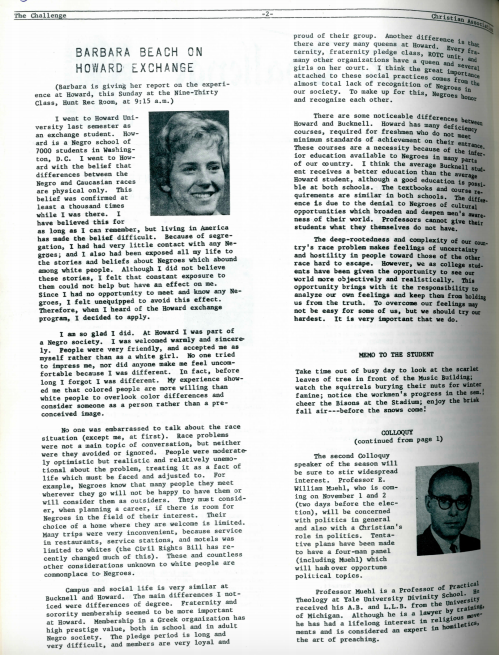
Barbara Beach on Howard Exchange
These three files from 1964 issues of The Challenge, The Bucknell Alumnus, and the Bucknellian, respectively, describe, in her own words, Barbara Beach’s very positive, semester-long experience at Howard University as an exchange student. Howard is the historically black college founded in 1867 in Washington, D.C. Beach states that it reinforced her belief a thousand times over that “the differences between the…races are physical only.” She announces that she will be giving a presentation on her semester during a class later in the week.
NAACP
NAACP Conference on Migrant Labor Issues
The Bucknell chapter of the NAACP (National Association for the Advancement of Colored People) sponsored a one-day conference to raise awareness of the working conditions of those engaged in migratory labor. This Bucknellian article lists several prominent speakers who participated in the conference along with the schedule of events and topics to be discussed.
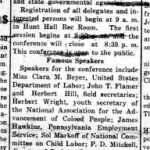
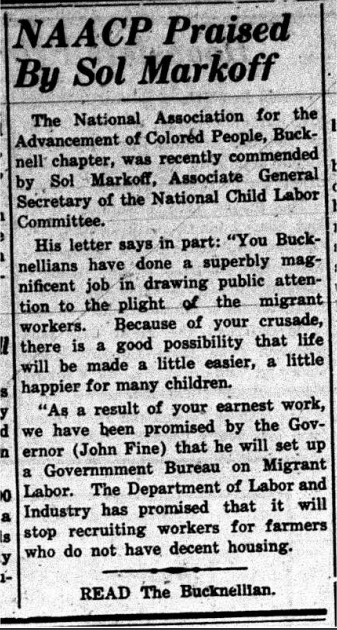
NAACP Praised by Sol Markoff
This Bucknellian article from November 1952 shares commends the progressive steps undertaken by Bucknell. Associate General Secretary of the National Child Labor Committee, Sol Markoff (1913-1991), commends the National Association for the Advancement of Colored People (NAACP) for their part in drawing public attention to the plight of migrant workers. He believes that Bucknell’s effort was instrumental and crucial in publicizing this issue and it will definitively bring about positive effects on the lives of many families of migrant workers across the state, children especially.
NAACP Conference on Migrant Labor Issue to be Held Saturday
This Bucknellian issue from May 1952 shares that the Bucknell chapter of the NAACP (National Association for the Advancement of Colored People) will sponsor a one-day conference to raise awareness of the working conditions of those engaged in migratory labor. This Bucknellian article lists several prominent speakers who will be participating in the conference along with the schedule of events and topics to be discussed.
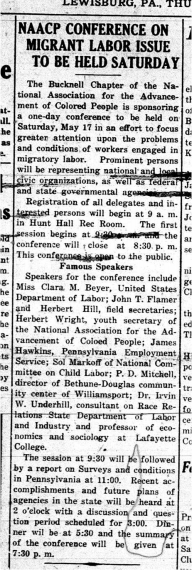
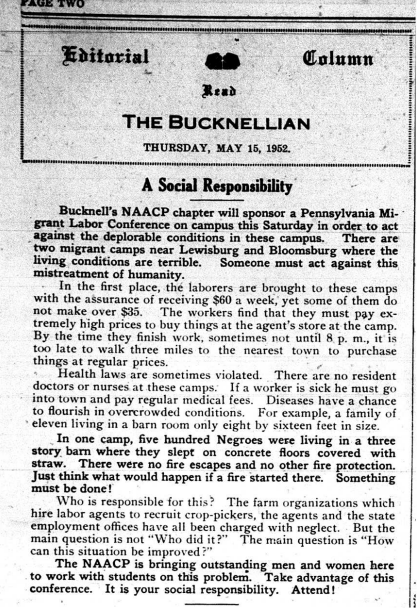
A Social Responsibility
In this May 1952 Bucknellian editorial, the author encourages students to participate in the upcoming Migrant Labor Conference by calling attention to the terrible working conditions of nearby camps, particularly for black workers outside Lewisburg and Bloomsburg. The author claims it is the reader’s “social responsibility” to attend.
NAACP Joins National Fight for Freedom
This Bucknellian article from October 1953 announces how the Bucknell NAACP chapter (National Association for the Advancement of Colored People) takes an active part in campaigns in the national organization in Washington. The organization hopes to raise one million dollars a year to assist in the goal of achieving complete equality in 10 years. They also share work in relation to migrant labor rights and an upcoming radio show.
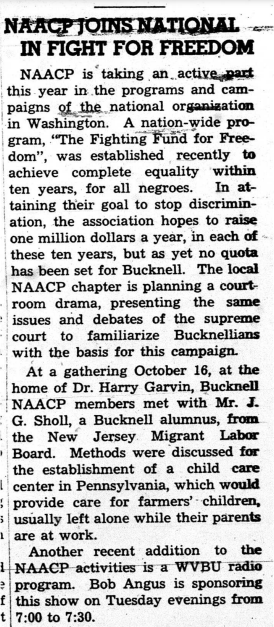
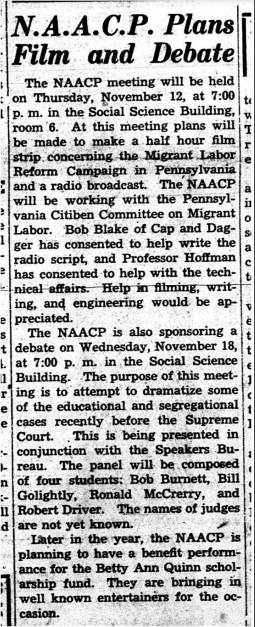
NAACP Plans Film and Debate
According to this article in the Bucknellian from November 1953, the Bucknell NAACP chapter (National Association for the Advancement of Colored People) plans to make a film and radio broadcast about the Migrant Labor Reform Campaign in Pennsylvania and requests help from students with the project. They also announce the sponsorship of a debate panel about educational and segregational cases brought before the Supreme Court recently. The article ends with the promise of a performance that would benefit the Betty Ann Quinn Scholarship fund.
Civil Rights Company Boycott
Questionnaire to Bucknell Students Concerning the Recent Southern Sit-in Strikes
This survey was released to Bucknell students in 1960 to get an idea about their feelings and opinions on the Civil Rights movement, African American people, and integration in general. It asked about students’ awareness, desires, and limitations in the form of Yes or No questions.
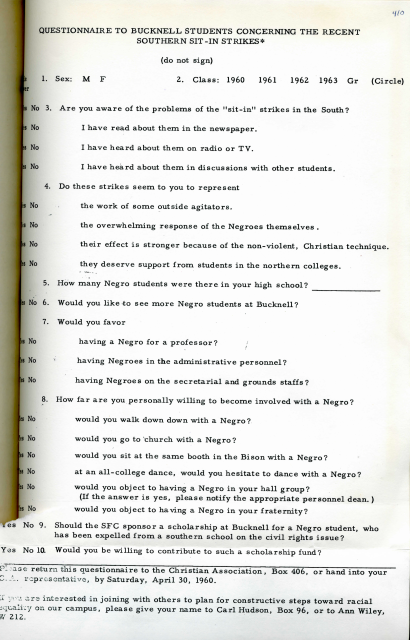
Civil Rights Paper Company Boycott
In 1965, the national civil rights organization, the Student Nonviolent Coordinating Committee urged universities to boycott the Hammermill Paper Company because of their decision to build a paper mill in Selma, Alabama. At this time, Martin Luther King Jr. was calling for a national boycott of Alabama products in order to pressure the state into integration. With pressure from students to join the boycott, Vice President Zeller corresponded with Hammermill’s president in an attempt to resolve the boycott situation and reassure students.
Letter to Hammerhill Paper Company President
In this official university correspondence from March 26, 1965, John F. Zeller (1919-2010) (‘41; Vice President of Bucknell from 1955-1984; Interim President of Bucknell in 1984) writes to Hammermill to alert their President about Bucknell’s refusal to stand by student urge to Boycott. Zeller cites the quality of the product and service of Hammermill in the past, which makes him an understanding and sympathetic client. He requests a letter from Hammermill pledging that they won’t discriminate when hiring at their plant in Selma to appease Bucknell students calling for a boycott of Hammermill products.
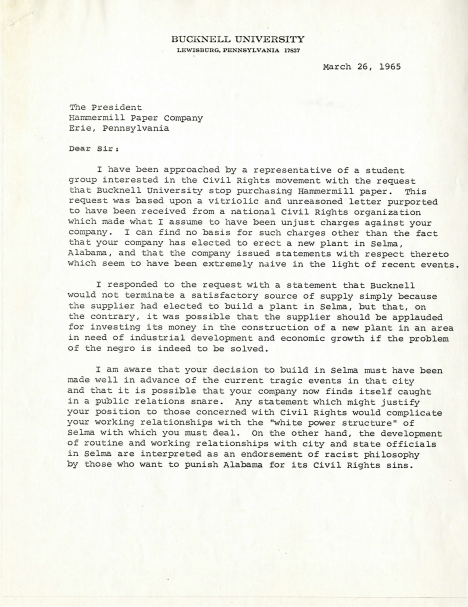
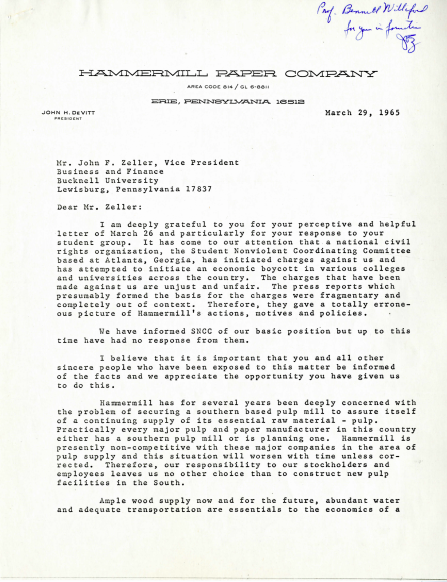
Hammermill Paper Company Response
In this official university correspondence from March 29, 1965, Hammermill Paper Company writes in response to John F. Zeller (1919-2010) (‘41; Vice President of Bucknell from 1955-1984; Interim President of Bucknell in 1984) in gratitude for Bucknell’s rejection of the nation-wide boycott against their company. Hammermill refutes the SNCC’s (Student Nonviolent Coordinating Committee) discrimination charges against them and informs Zeller of the anti-discrimination policies inherent to their company.
Viewpoints
*Add info about viewpoints here